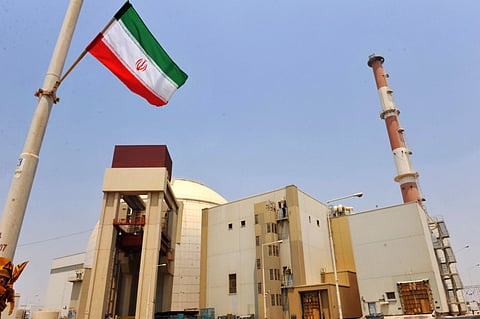Debate over Iran deal is utterly perplexing
Tehran is encumbered by economic pressures and nuclear constraints, so it would be senseless to give the country an early release

As one of the architects of a 10-year sanctions campaign against Iran under US Presidents George W. Bush and Barack Obama, and the Treasury Department official charged with delivering sanctions relief pursuant to the Joint Comprehensive Plan of Action (JCPOA), I find the debate over the 2015 Iran deal somewhat baffling. Iran and its proxies are threatening US allies and interests across the Middle East, from Syria to Lebanon and Yemen to Iraq. Why would we risk letting Iran out of its nuclear shackles now? I know the threat Iran poses and understand certain misgivings about the agreement. While the deal prohibits Iran from pursuing a nuclear weapon forever, its restrictions on uranium enrichment for civil purposes begin to ease in a decade, sooner than any Iran-sceptic would like.
In its central elements, though, the deal is strong. Iran has been stripped of 98 per cent of its enriched uranium, pushing it far from nuclear breakout. Its heavy-water reactor has been permanently disabled. And a far-reaching inspections regime allows scores of International Atomic Energy Agency (IAEA) inspectors to scrutinise any site where they have reason to suspect cheating. If this doesn’t sound like much, remember that in 2010, we faced a country with 50 times more enriched material than it has today, 17,000 centrifuges churning out more material every month, a heavy-water reactor under construction and no IAEA inspectors on the ground. No wonder senior Israeli military and intelligence experts have expressed anxiety about the deal collapsing.
Malign activities
I could perhaps understand those who want to end the JCPOA if the sanctions relief was transforming Iran into a far more dangerous threat. I saw the warnings: $150 billion (Dh550.5 billion) windfalls and billions of new dollars pouring into terrorist coffers. It did not happen. Iran recouped foreign reserves that had been encumbered — about $50 billion. But Iran’s economy was in a $500 billion hole. Measured in current dollars (accounting for exchange rate movements), Iran’s gross domestic product this year is projected by the International Monetary Fund to be 35 per cent lower than it was in 2011. There are, to be sure, benefits to Iran for staying in the deal, but those benefits will take years to accrue. And contrary to the warnings, Iran’s client Hezbollah has been under unprecedented financial pressure. This summer, billboards went up in Lebanon offering an exemption from militia service in exchange for $1,000 donations. The administration is right to call for an intensified international campaign to confront Iran’s malign activities. Targeted sanctions, interdictions, military cooperation with our allies and diplomatic pressure are all warranted. But the nuclear deal allows this, and the Treasury Department has already taken important steps in sanctioning Iranian cyber and missile-procurement networks. Hopefully, the European Union can be persuaded to designate Hezbollah as a terrorist group in its entirety, and drop the illusory distinction between its “military” and “political” wings.
Undermining US sanctions
But destabilising a deal that is supported by the international community in the absence of a serious Iranian breach would make it harder — not easier — for the US to forge such a coalition. It would also undermine US sanctions as a tool of inducing change in the future. Why would a target of sanctions change its behaviour in exchange for a promise of relief if the US is not as good as its word?
Recently, some have argued that the administration should continue to waive sanctions but simultaneously refuse to certify Iran’s compliance with the deal to Congress based on concerns outside of the nuclear arena. If Iran breaches the nuclear agreement in a material way, the administration should absolutely threaten to snap sanctions back. But if the IAEA says that Iran is abiding by its commitments, refusing to certify based on conduct that is outside the scope of the deal would look like what it is: gamesmanship. Great nations do not play games when it comes to their international agreements. Doing so would be especially short-sighted when we are trying to convince the world to join us in a North Korea sanctions campaign whose stated objective is nuclear diplomacy.
In bare-knuckled sanctions terms, anyone who suggests that we can isolate a JCPOA-compliant Iran by threatening to cut uncooperative countries off from the US dollar has not sat in the seat I did. When there is general agreement on the objective, we can use our leverage to intensify pressure, as we did with Iran’s nuclear programme. But we will not be able to coerce Europe, Russia and China into shunning Iran’s economy over policy interests that they do not share. The only Iranian threat ever recognised as such by the UN Security Council was its nuclear programme. And to dictate US foreign policy to the world on threat of losing access to the dollar is to threaten the long-term primacy of the US dollar and undermine our own markets and leverage.
Iran today is encumbered by economic pressures and a decade of tough nuclear constraints. It would be senseless to squander America’s international influence and give Iran an early release.
— Washington Post
Adam J. Szubin, a distinguished practitioner-in-residence at the Johns Hopkins School of Advanced International Studies, was acting undersecretary of the treasury for terrorism and financial intelligence from 2015 to 2017 and director of the Office of Foreign Assets Control from 2006 to 2015.


